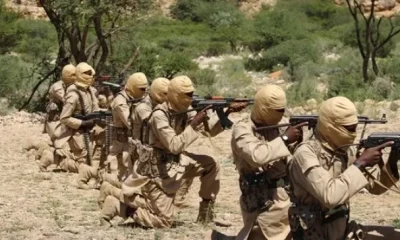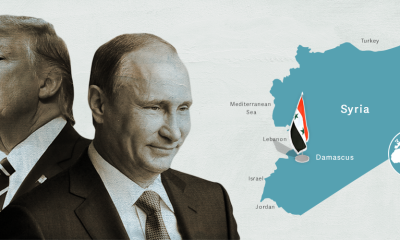Commentary
Iranian General Admits ‘Very Bad Defeat’ in Syria, Criticizes Assad and Russia

Brig. Gen. Behrouz Esbati openly acknowledges Iran’s strategic failures in Syria, blaming Assad’s inaction and Russian duplicity for the loss of influence.
In an unprecedented admission, Brigadier General Behrouz Esbati, a key figure in Iran’s military strategy in Syria, has described Iran’s involvement in the Syrian conflict as a “very bad defeat.” Speaking at Tehran’s Valiasr mosque, Esbati acknowledged the profound setbacks Iran has faced, including the collapse of Bashar al-Assad’s regime and the erosion of its strategic foothold in Syria.
Esbati, who oversaw Iranian military operations in Syria, offered a rare critique of both Assad and Iran’s primary ally, Russia. He blamed widespread corruption and oppressive governance under Assad for creating conditions that made the regime’s fall inevitable. The general revealed that Assad repeatedly ignored Tehran’s warnings to implement political reforms that might have preserved his grip on power.
Russia, meanwhile, stands accused of duplicitous actions during the conflict. Esbati alleged that Russian forces misled Iranian commanders, claiming to target opposition forces while instead dropping bombs on uninhabited areas. Additionally, he criticized Russia for disabling radar systems, effectively facilitating Israeli airstrikes on Iranian positions in Syria.
Iran’s strategic losses extend beyond Syria. Esbati noted that Israeli strikes have significantly degraded Iran’s air defense capabilities, leaving them “essentially naked.” Iran’s traditional allies, including Hezbollah and Hamas, are no longer in a position to mount large-scale support, further diminishing Iran’s regional leverage.
Despite the setbacks, Esbati indicated that Iran would pivot to unconventional methods to maintain influence in Syria. This includes mobilizing resistance cells and leveraging long-established social networks within Syrian society. “We can activate the social layers that our guys lived among for years; we can be active in social media and form resistance cells,” he stated, hinting at a shift toward insurgent and grassroots operations.
Esbati’s candid remarks represent a stark departure from the Iranian regime’s typically guarded narrative. They highlight the depth of Iran’s losses in Syria and the broader challenges it faces as its regional strategy falters. With weakened allies, compromised defenses, and diminishing credibility, Iran’s path forward in Syria appears fraught with uncertainty.
Commentary
China Plans World’s Largest Dam, Will Generate 300 Billion KWH of Power Yearly

From megadams in Tibet to solar stations in space, China’s ambitious energy projects signal its drive to lead in renewable energy innovation.
China is pushing the boundaries of energy innovation, unveiling plans that could reshape global renewable energy dynamics. With a commitment to achieving net-zero emissions by 2060, the nation has turned its attention skyward, planning an ambitious solar power station in space. At the same time, its terrestrial energy ambitions remain undiminished, as evidenced by the upcoming hydropower project on the Yarlung Tsangpo River in Tibet.
The space-bound solar power station, dubbed the “Three Gorges Dam in Space,” represents a groundbreaking effort to harness energy beyond Earth’s atmosphere. Using super-heavy rockets, China plans to assemble a solar power station in orbit capable of capturing sunlight and transmitting energy back to Earth via microwave or laser beams.
Rocket scientist Wang Xiaojun revealed the blueprint, emphasizing that this “incredible project” aligns with China’s strategy to achieve energy security while significantly cutting carbon emissions. The project, while still in its early stages, underscores China’s vision of integrating advanced technology with sustainable development.
On Earth, China is constructing a mega hydropower project over the Yarlung Tsangpo River in Tibet—a river that holds sacred significance and boasts the deepest canyon on the planet. The proposed dam will generate a staggering 300 billion kilowatt-hours of power annually, tripling the output of the Three Gorges Dam.
The project is not without controversy. Drilling tunnels up to 20 kilometers long to divert river flow and tapping into the steep gradients of the plateau pose significant technical and ecological challenges. Furthermore, the area’s geological instability due to tectonic activity increases the risks associated with such a monumental undertaking.
Both projects highlight China’s willingness to undertake bold, high-risk ventures to secure its energy future. The hydropower initiative in Tibet has drawn concerns about the region’s fragile ecosystem and its cultural implications, particularly for Tibetans who regard the Yarlung Tsangpo as sacred.
On the other hand, the space-based solar station faces technological hurdles, including the development of efficient energy transmission methods and ensuring safety during assembly and operation.
China’s dual ambitions of creating a massive space-based energy system and a record-breaking hydropower project signify more than a commitment to renewable energy. They also signal the nation’s geopolitical aspirations. By mastering advanced energy technologies, China is positioning itself as a global leader in clean energy—a move likely to unsettle traditional energy powers.
The hydropower project in Tibet could also heighten regional tensions, particularly with India, as the Yarlung Tsangpo flows into India’s Brahmaputra River. Concerns over water security and downstream ecological impacts will likely dominate regional diplomatic discussions.
China’s ventures into space and its terrestrial mega-dam illustrate the duality of its approach: leveraging cutting-edge technology for sustainability while grappling with the environmental and geopolitical complexities of large-scale infrastructure projects. As these projects unfold, they will serve as a litmus test for the feasibility of bold energy solutions in the face of ecological, technical, and geopolitical challenges.
Whether on Earth or in space, China’s ambitions are shaping the future of global energy.
Commentary
Attack on Chad’s Presidential Palace Leaves 19 Dead, Government Claims Control
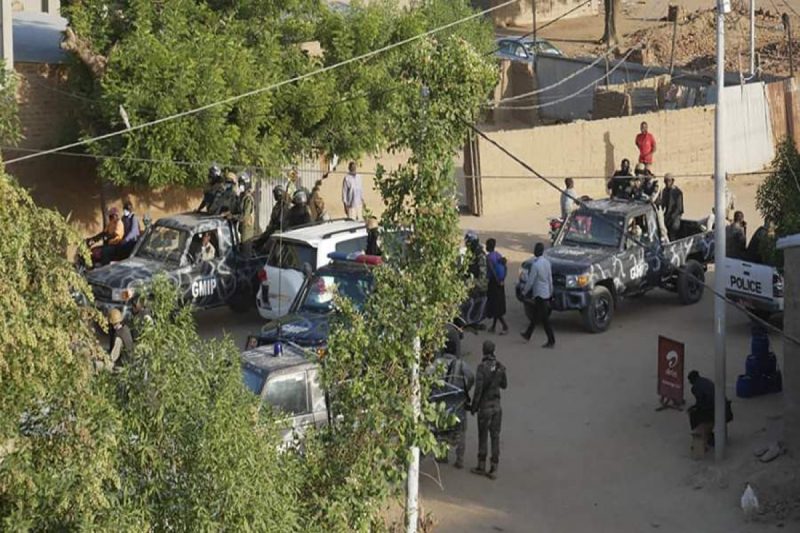
Armed commando assault on N’Djamena’s presidential palace sparks deadly clash; government faces opposition skepticism over official account.
Calm returned to N’Djamena on Thursday morning following a dramatic assault on Chad’s presidential palace the previous evening. The heavily armed attack, carried out by a 24-member commando unit, resulted in 19 fatalities, including 18 of the attackers and one member of the presidential guard, according to government reports.
The clash began shortly before 8:00 pm local time, with heavy gunfire echoing through the center of the capital. Security forces swiftly subdued the assailants, whom government spokesman and Foreign Minister Abderaman Koulamallah described as a group of “drunken criminals” armed with weapons, machetes, and knives. Dressed in civilian clothing, the attackers reportedly originated from a poor southern neighborhood of the city.
In a video statement released hours after the violence, Koulamallah reassured the public, declaring, “The situation is completely under control… The destabilization attempt was put down.” He confirmed that Chad’s president, Mahamat Idriss Deby Itno, was inside the palace during the attack but did not provide further details on the incident.
While the government has lauded its forces’ swift response, opposition figures have questioned the official narrative. Max Kemkoye, spokesman for the Political Actors’ Consultation Group (GCAP), accused authorities of fabricating the event as a pretext to tighten their grip on power.
Chad’s government, led by President Deby since his takeover in 2021 following his father’s death, has faced growing dissent amid claims of corruption and unfulfilled promises of a transition to democratic rule. Wednesday’s attack has heightened concerns about instability in the military-ruled nation, where the government has struggled to balance internal security with regional challenges.
The opposition’s skepticism underscores the fraught political climate in Chad. Many opposition groups view the attack as either a fabricated incident or a deliberate overstatement to justify increased security measures.
As the international community awaits further clarification, the government has promised a briefing to diplomats and a prosecutor’s statement later in the day. For now, the deadly assault leaves Chad at a crossroads, with questions lingering about the motivations behind the attack and its implications for the country’s fragile political landscape.
Commentary
Assad’s Former Aide Claims Putin “Tricked” Deposed Syrian President During Final Days

Kamel Saqr reveals Assad’s last-ditch pleas for support to Putin and his hasty escape as rebel forces closed in on Damascus.
Bashar al-Assad’s dramatic fall from power has been shrouded in speculation, but recent revelations from his former media chief, Kamel Saqr, suggest Russian President Vladimir Putin may have played a pivotal role in the ousted Syrian president’s undoing. In a candid interview with Mazeej Studios, Saqr painted a picture of Assad’s desperate final days, marked by failed requests for military support and an unceremonious escape from Damascus.
According to Saqr, Assad sought Putin’s assistance during a critical meeting in Moscow on November 29, just over a week before Damascus fell to opposition forces. At the time, rebels had already gained significant ground in Aleppo, and Assad’s position was rapidly deteriorating. Faced with dwindling support from Iran and Hezbollah, Assad pleaded with Putin to facilitate the transport of Iranian military aid via Russia’s Hmeimim airbase in Latakia.
While Putin reportedly agreed to assist, Saqr claims that no action was taken. Iranian officials later informed Assad that their attempts to mobilize were met with silence from Moscow and warnings from the United States, which threatened to shoot down any Iranian aircraft attempting to deliver aid. This inaction, Saqr alleges, points to deliberate deception by Putin, leaving Assad without crucial reinforcements as the opposition closed in.
The political isolation deepened as Turkey, a key supporter of the rebel offensive, declared an end to mediation efforts. Despite persistent requests from Russia and Iran, Assad refused to meet Turkish President Recep Tayyip Erdogan, dismissing such overtures as ploys for concessions.
In the days leading up to Damascus’ fall, Saqr recounts how Assad’s attempts to contact Putin went unanswered. Faced with imminent defeat, Assad decided against addressing the Syrian public, shelving a prepared 400-word speech. Instead, he fled the capital on December 7, reportedly using a private plane to reach Moscow via the Hmeimim airbase.
Assad’s hasty departure underscored the unraveling of his alliances. Despite years of support from Russia and Iran during Syria’s 13-year civil war, both countries appeared unwilling to expend further resources on his failing regime.
Now reportedly in exile in Moscow, Assad’s fate is emblematic of a broader narrative of betrayal and strategic calculation by his erstwhile allies. Saqr’s claims not only shed light on the inner workings of Assad’s final days but also highlight the shifting dynamics of power and allegiance in the Syrian conflict.
As the international community reflects on Syria’s protracted war, the revelations from Assad’s former aide serve as a stark reminder of the fragility of alliances in geopolitics, where promises of support can evaporate as swiftly as they are made.
Commentary
CENTCOM and IDF Strategize Joint Operations Against Houthi Aggression

As Houthi ballistic missile strikes intensify, US and Israeli military leaders meet to bolster defense strategies in the Middle East.
Amid escalating Houthi ballistic missile strikes on Israel, senior military leaders from the United States and Israel convened to strategize their next moves. Admiral Brad Cooper, Deputy Commander of US Central Command (CENTCOM), and Maj. Gen. Amir Baram, Deputy Chief of Staff of the Israel Defense Forces (IDF), met at several key air force bases, including the Nevatim base in southern Israel. This meeting underscores the growing urgency of addressing the Houthi threat in the region.
The Houthis have launched an unrelenting campaign against Israel, firing over 200 ballistic missiles and nearly 200 drones in recent months. While Israeli air defense systems have successfully intercepted many of these threats, the impact on civilian life remains severe. Millions of Israelis have sought refuge in bomb shelters during the attacks, and recent missile strikes caused significant damage, including NIS 11 million to a Tel Aviv-area school.
Despite a series of decisive Israeli strikes targeting Houthi-controlled maritime ports and Yemen’s international airport, as well as a key installation destroyed by a US CENTCOM strike on December 31, the Houthi attacks persist. These actions have not only strained Israel’s defense systems but also raised concerns about the group’s operational resilience and sustained missile capabilities.
Discussions during the meeting included enhancing joint intelligence to effectively target Houthi leadership and infrastructure. Brig.-Gen. Omer Tishler, the Air Force Chief of Staff, led a strategic briefing alongside Nevatim base commanders, exploring options for neutralizing the Houthi threat while addressing broader Middle Eastern security challenges.
The meeting also highlighted the robust military cooperation between Israel and the US. Joint drills involving Israeli F-35s and American F-15s, conducted as recently as 2023, demonstrate a shared commitment to operational readiness and regional stability. This collaboration is vital as the Houthis, bolstered by Iranian support, continue to act as a destabilizing force in the region.
As Israel and the US work to enhance their military strategies and intelligence capabilities, the joint effort underscores the complexity of countering the Houthi threat. The challenge lies not only in stopping the immediate missile attacks but also in dismantling the operational networks that enable such aggression, ensuring long-term security for Israel and its allies in the Middle East.
Commentary
Ghana’s John Mahama Returns as President Amid Economic Crisis

Sworn in for a third term, Mahama pledges to tackle corruption, unemployment, and Ghana’s worst economic crisis in decades.
John Dramani Mahama was sworn in as Ghana’s president on Tuesday, January 7, marking his third term as the country’s leader. Against a backdrop of severe economic hardship, Mahama’s return signals a potential reset for Ghana, as citizens hope for solutions to rising inflation, unemployment, and corruption.
Mahama, 65, began his political career as Ghana’s communications minister before ascending to the presidency in July 2012 following the death of President John Evans Atta Mills. He completed Mills’ term and secured his first full term in office in 2012. After being ousted in the 2016 election by Nana Akufo-Addo, Mahama’s return to power comes with significant expectations, fueled by his promises to “reset” the nation and prioritize economic recovery.
His campaign largely appealed to young Ghanaians and small-business owners, who saw his leadership as a pathway out of the country’s dire economic situation.
Ghana is grappling with its worst cost-of-living crisis in decades. Inflation has soared, the cedi currency has plummeted, and public debt has reached alarming levels. Mahama’s victory in December’s elections is widely seen as a mandate to address these economic challenges.
Andrew Takyi, founder of fintech company Zee Pay, expressed optimism, saying Mahama’s proposed 24-hour economy could widen the tax base for small and medium enterprises, boosting revenue.
Others, like Innocent Appiah from the Precious Minerals Marketing Company, anticipate reforms in the extractive industry to enhance transparency and accountability. “I anticipate policies that promote value addition, local content development, and community engagement, ultimately leading to increased revenue generation and socio-economic benefits for Ghanaians,” Appiah noted.
The inauguration ceremony saw citizens like trader Enyonam Agble expressing hope for change: “There was so much corruption under President Akufo-Addo, and all we want is the recovery of all that had been stolen to rebuild the country.”
Mahama has pledged to tackle corruption and restore public trust in governance. His administration faces the dual challenge of stabilizing the economy and addressing public frustration over systemic corruption.
West Africa, plagued by extremist violence and political instability, views Ghana as a democratic stronghold. The generally peaceful election, praised by ECOWAS, underscores Ghana’s reputation as a beacon of democracy in the region.
As Mahama begins his third term, the focus will be on implementing policies that deliver tangible economic improvements. His leadership will be scrutinized closely, with both domestic and international observers eager to see how his administration addresses Ghana’s pressing challenges and steers the nation toward recovery.
Commentary
Puntland Denies Amnesty to Foreign ISIS Fighters

Puntland forces intensify strikes on ISIS bases after deadly attack, signaling zero tolerance for foreign militants in the region.
Puntland authorities have taken a hardline stance against ISIS militants entrenched in the Al Miskat mountains, rejecting any possibility of amnesty for foreign fighters while offering Somali nationals one last chance to surrender. The decision comes in the wake of a devastating assault by ISIS on a Puntland military base in Dharjaalle, underscoring the escalating threat posed by the group in northeastern Somalia.
General Abdirahman of the Puntland Marine Police Force (PMPF) made it unequivocally clear: foreign ISIS militants hiding in Puntland territory will not receive amnesty. “Foreign terrorists from different countries will not be granted amnesty,” he declared, signaling Puntland’s commitment to eradicating external extremist elements from its borders.
This announcement follows a brutal attack in Dharjaalle, where 12 ISIS militants, including foreign nationals, targeted a Puntland military base using explosive-laden vehicles. Puntland security forces responded by launching a large-scale offensive, dismantling several militant bases in the rugged Al Miskat mountain region, a known ISIS stronghold.
Retaliatory Operations
Puntland’s military response has been swift and decisive. Security forces destroyed multiple ISIS hideouts in the Al Miskat mountains, aiming to cripple the group’s operational capabilities. Regional officials confirmed the success of these operations, although the full extent of the militant group’s losses remains unclear.
ISIS, meanwhile, claimed responsibility for the Dharjaalle attack, asserting that it killed 22 Puntland troops and injured dozens more. These figures remain unverified, highlighting the fog of war that often accompanies such incidents.
ISIS Presence in Puntland
Since 2017, ISIS has maintained a foothold in Puntland, leveraging the region’s remote terrain to establish bases and launch attacks. While historically seen as a lesser threat compared to al-Shabaab, ISIS has demonstrated an alarming ability to conduct coordinated assaults, as evidenced by the Dharjaalle attack.
The increasing activity of ISIS in Puntland has raised concerns about its growing influence and the potential for further destabilization in the region.
Puntland’s firm stance against foreign ISIS fighters and its intensified military operations reflect its commitment to combating terrorism within its borders. However, the persistence of ISIS in the Al Miskat mountains underscores the broader challenges Somalia faces in eradicating extremist groups. As Puntland ramps up its efforts, the international community will closely watch the region’s ability to contain this evolving threat.
Commentary
EU Faces Pressure to Tackle Musk’s Alleged Electoral Interference

Brussels considers legal action under the Digital Services Act as Elon Musk’s support for Germany’s far-right party ignites controversy ahead of February elections.
The European Union faces a complex challenge as Elon Musk, soon to be part of the Trump administration, is accused of leveraging his platform, X, to bolster Germany’s far-right Alternative for Germany (AfD) party ahead of February’s elections. Musk’s decision to host AfD leader Alice Weidel in a livestream on X has sparked outrage across Europe, raising questions about potential breaches of the EU’s Digital Services Act (DSA) and the broader implications for transatlantic relations.
Musk’s livestream with Weidel has fueled accusations of interference in Germany’s electoral process. Critics argue that the exposure on X unfairly amplifies the AfD’s message, which resonates with populist and anti-immigration sentiments. The AfD, which has been accused of trivializing Nazi crimes, is polling second in Germany, intensifying concerns about the platform’s impact on democratic processes.
French President Emmanuel Macron has openly criticized Musk’s actions, calling them a direct threat to European political stability. European lawmakers and regulators are now urging Brussels to investigate Musk’s compliance with the DSA, which obliges platforms to mitigate risks to electoral integrity and media pluralism.
The Digital Services Act: Legal Implications
The DSA, enacted to hold large platforms accountable for the content they amplify, is central to the EU’s potential legal action against X.
- Key Allegations: Critics argue that X’s algorithms disproportionately boost far-right content, drowning out progressive voices. German Green MEP Alexandra Geese highlighted the issue, stating that while Musk’s livestream falls under freedom of expression, the algorithmic manipulation violates EU regulations.
- Risk Mitigation Obligations: The DSA mandates platforms to address public risks, including the amplification of hate speech or the undermining of fair competition in elections. Musk’s actions may be scrutinized for failing to uphold these obligations.
The European Commission has already begun examining X’s compliance with the DSA and plans to hold discussions with German regulators and X on January 24.
The issue transcends legalities, entering the realm of geopolitics. Musk’s upcoming role in the Trump administration adds a layer of complexity, with analysts warning that legal actions could provoke tensions between Brussels and Washington.
Felix Kartte of Germany’s Mercator Foundation noted that confronting Musk could be interpreted as challenging the incoming U.S. administration. However, Kartte emphasized that if X’s algorithmic practices amplify illegal hate speech or destabilize media pluralism, regulators would have a strong case under the DSA.
The EU must balance its regulatory responsibilities with political pragmatism. While some lawmakers are urging swift action to protect democratic processes, others caution against escalating tensions with the U.S. before Trump’s inauguration.
German MEP Damian Boeselager has called for an investigation into Musk’s alleged manipulation of X’s algorithms to amplify his own content, questioning whether such practices diminish the freedom of speech for others.
The EU’s response to Musk’s actions could set a precedent for how digital platforms are held accountable during elections. While legal action under the DSA is a possibility, the decision will ultimately depend on Brussels’ ability to navigate the intersection of law, technology, and geopolitics. As the February election approaches, the EU’s resolve to enforce its digital rulebook will be tested like never before.
Commentary
Justin Trudeau: The Rise and Fall of Canada’s Liberal Superstar

From a rockstar prime minister to a symbol of political discontent, Trudeau’s tenure is a story of highs, controversies, and a bitter end.
When Justin Trudeau became Canada’s prime minister in 2015, he was hailed as a progressive trailblazer, bringing a fresh vision and charisma to Canadian politics. But nearly a decade later, Trudeau’s tenure ends with a Liberal party in disarray and a nation increasingly disillusioned by his leadership.
The Meteoric Rise: From Legacy to Leadership
Born into political royalty as the son of four-term Prime Minister Pierre Trudeau, Justin Trudeau seemed destined for public life. After stepping into politics in 2008, he quickly became the face of renewal for a struggling Liberal Party.
In 2015, Trudeau ended nearly a decade of Conservative rule with promises of gender parity, climate action, Indigenous reconciliation, and openness to refugees. His boyish charm and progressive rhetoric captured international attention, earning him the moniker of a “rockstar politician.” Rolling Stone famously put him on its cover, asking, “Why can’t he be our PM?”
The Long Descent: Controversies and Unfulfilled Promises
While Trudeau’s early years brought optimism, his leadership soon became riddled with controversies. Ethics violations, the SNC-Lavalin scandal, and the damaging “blackface” incident in 2019 chipped away at his image. His handling of Indigenous issues and housing affordability drew sharp criticism, as did his perceived heavy-handedness during the 2022 trucker strike.
Internationally, Trudeau faced setbacks, including a failed bid for a UN Security Council seat and strained relations with India, exacerbated by accusations against New Delhi regarding a Canadian citizen’s assassination.
By 2024, his party was bleeding support. The New Democrats withdrew their alliance, and Trudeau’s approval ratings hit historic lows. Calls for his resignation grew louder after longtime ally Chrystia Freeland resigned, accusing him of prioritizing political optics over the public good.
Legacy in Question
Trudeau’s resignation marks the end of an era. His early accomplishments in advancing progressive causes and reshaping Canada’s global image remain notable. However, the mounting controversies, policy missteps, and an economy under strain tarnish his legacy.
While history may eventually view him more kindly, Trudeau leaves behind a fractured Liberal Party and a political landscape ripe for change. Whether his impact endures as a reformer or a symbol of lost promise will depend on how Canada navigates the post-Trudeau era.
-

 Africa9 months ago
Africa9 months agoHow Somaliland Could Lead the Global Camel Milk Industry
-

 Top stories9 months ago
Top stories9 months agoIsrael Announces Plans to Reopen Border Crossings: The Latest Developments
-

 Editor's Pick10 months ago
Editor's Pick10 months agoHow the Greatest Hacker Manipulated Everyon
-

 Analysis9 months ago
Analysis9 months agoBiden Stands Firm with Israel Amid Iran’s Aggression: A Test of Resilience
-
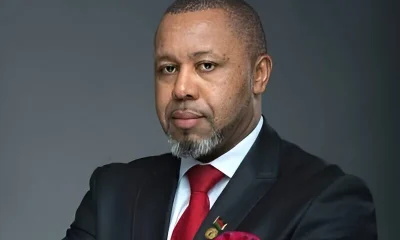
 Top stories7 months ago
Top stories7 months agoTragedy Strikes Malawi: Vice President Saulos Chilima Among Victims in Fatal Plane Crash
-
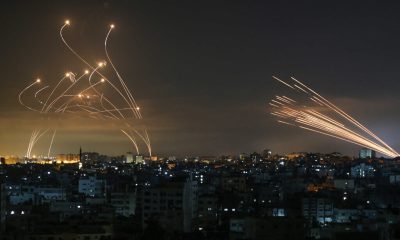
 Analysis9 months ago
Analysis9 months agoIran escalates conflict, attacking Israel; US forces help Israel to intercept Iranian projectiles
-

 Analysis9 months ago
Analysis9 months agoIsrael and Iran on Edge: Tensions Escalate Amidst Rising Threats
-

 Analysis7 months ago
Analysis7 months agoA New Dawn for Somaliland: Global Recognition Expected by June 2024











